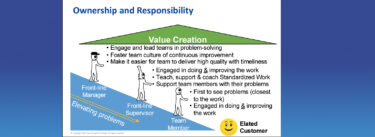Simon & Schuster has just re-issued The Machine That Changed the World, which Dan Jones, Dan Roos, and I co-authored 17 years ago. Doubtless, our publisher has noticed the current Toyota boom when any book with “Toyota” on the cover sells.
Fortunately, Machine is still the best description of the complete Toyota business system – product development, supplier management, dealing with the customer, fulfilling orders from raw materials through production, and management of the global enterprise. It still has a story to tell. As new CEO Alan Mulally remarked to Ford employees when he arrived in Detroit last fall, it is the best summary of why Toyota is winning.
But in fact Toyota has already won. It’s just a matter of totaling units sold and revenues during 2007 to know exactly when to transfer the industry leader’s jersey from GM to Toyota. Much more important from a business standpoint, Toyota won the profitability race years ago.
The interesting question for the future is not the precise day Toyota wins but how Toyota can lose. The conventional wisdom is that it may fumble on quality (as evidenced by recent recalls) or go soft on costs or stumble in trying to make Lexus a truly elite brand or fail to gain a stable production and sales base in the emerging markets of China and India.
And these could happen. But if they do they will be symptoms, not the root cause. Toyota’s real challenge for the future is to introduce and sustain lean management and lean leadership at every point in a rapidly growing organization.
It’s sobering to realize that many new employees at Toyota read Jeff Liker’s The Toyota Way and Jeff and Dave Meier’s The Toyota Way Field Book (which every lean thinker should read as well) to try to understand the company they have joined. Toyota’s traditional way of creating managers by hiring them straight from high school or college and carefully coaching them over many years to become seasoned Toyota-style leaders is being severely strained by Toyota’s breakneck growth rate. There are too many new pupils and not enough mature teachers as Toyota opens new plants, engineering centers, and supplier development groups across the world.
Toyota’s great risk, the way it can lose, is that its new managers and the managers in its new suppliers will revert to the old, mass-production mentality of the companies or schools they have come from. If this happens, Toyota’s management performance will regress toward the mean. Instead of moving the whole world to embrace lean management, Toyota will become just another company. And that will be a tragic failure for us all.
What does Toyota need to teach its new lean managers? Obviously, the specific methods (tools) for conducting production, product design, supplier management, and sales are important. But these are the easy part. The heart of the lean manager’s knowledge is strategy deployment originating with senior managers, A3 problem solving for line managers in the middle of the organization, and standardized work for primary supervisors near the bottom.
And at every level Toyota needs to teach its managers to utilize these concepts by going to the gemba. There, they need to lead by asking questions about the true business problem, the current condition causing the problem, a better condition (that is, a better process) that could address the problem, who must do what when to achieve this new condition (the future state), and what evidence will show that the problem has been addressed.
This means managing the organization’s value-creating processes (value streams) by asking highly informed questions rather than managing results at the end of the reporting period. (The latter is simply another form of end-of-the-line quality inspection.) And it means avoiding a resort to orders on what to do next when matters seem to be getting out of hand.
Issuing crisp orders is the natural instinct of any boss. Indeed, most bosses seem to think that by virtue of their experience and authority, they should be able to solve any problem lower in the organization. But orders from the boss rather than informed questions take away the lower-level managers’ responsibility for solving problems. They start a vicious circle in which lower-level managers wait to be told what to do by higher-level managers who are much further from the gemba where value is created and who inherently have less – not more – knowledge of the best thing to do.
Compared with the rest of us, Toyota has one major advantage. It never acquires companies or facilities. It expands by opening “greenfield” operations in new locations. So if it finds that it can’t grow lean managers at the same rate as sales it can simply slow down. And my bet is that Toyota will slow down if it senses that its management values are being diluted.
The rest of us face a harder problem. We already own and operate “brownfields” that urgently need a transformation in their management. Slowing down this transformation simply makes us fail faster!
In summary, Toyota can fail and if it does the root cause will be a failure to propagate its management system. We can also fail. And if we do the root cause will be a failure to transform our outdated mass-production approach to management. Thus it turns out that we all face the same challenge!
It follows that all of us in the Lean Community need to learn from each other about the best way to create lean managers and lean leaders. I’m happy to report that sharing our experience will be a key objective of the Lean Enterprise Institute as we begin our second decade next fall. We don’t want anyone to fail.
Best regards,
Jim
Jim Womack
Chairman and Founder
Lean Enterprise Institute
P.S. For years — and again in recent weeks as I have been speaking at lean conferences in Australia — readers have come up to me to say that Machine was a great book about factories. And I hope this is true. But anyone who says this didn’t understand the book. Machine is about factories and it is also about manufacturing more broadly. But it’s much more important contribution is to describe for the first time a complete, lean business system, a new way of managing multi-function organizations that is relevant to any organization creating any type of value.
I’m hopeful that original readers will now give Machine a fresh look and that a new generation of readers will discover the book and read it for lessons on lean management going far beyond its lessons for lean production. Dan, Dan and I have written a new Foreword and Afterword for the re-issued book to place it in historical perspective and to describe what we’ve learned in the years since it was published.






